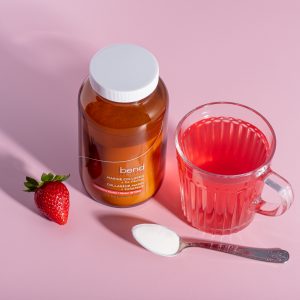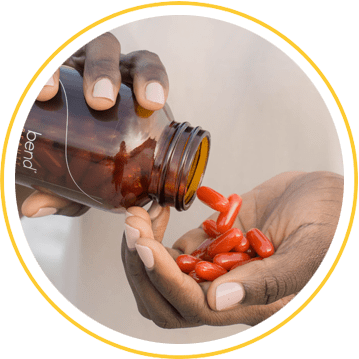
If you’re keeping up with beauty and skincare trends, chances are you’ve heard of Marine or Fish Collagen. What are some health benefits of ingesting marine collagen powder? Read on to see what the science says.
Fish Collagen produces Positive Changes in Skin Health
As we age, the type I collagen in our skin (the same kind that’s in marine collagen) weakens, leading to visible signs of aging including saggy and wrinkly skin (1). Preclinical studies show that ingesting marine collagen repairs skin collagen and elastin protein fibers and produces a significant thickening of the outer skin surface (epidermis). Human studies have reported decreased wrinkles and improved skin hydration and firmness following marine collagen supplementation (2,3).
Provides Antioxidant Protection
Marine collagen contains several amino acids: lysine, glycine, proline, and hydroxyproline (1). Proline and glycine play important antioxidant roles by protecting against free radicals that cause cell damage (4,5). Hydroxyproline is made into glycine and it may help regulate a cell’s oxidative state (6). Preclinical studies show that marine collagen protects against oxidative skin damage caused by ultraviolet (UV) light (sunlight) (7).
Promotes Bone Growth/Healing/Strength
In cell culture, ingesting marine collagen increases collagen synthesis and helps incorporate minerals into the bone matrix. In addition, marine collagen supplementation significantly increases the size and mineral density of femur bones (8).
Bone strength depends not only on the quantity of bone tissue but also on the quality, which is altered by its geometry, shape, mineral content and composition, and its collagen microstructure. In cell culture, marine collagen improves collagen quality while supplementation in animals significantly increases bone mineral density and toughness (8,9).
Improves Protein Intake and Body Composition
Optimal dietary protein intake beneficially impacts weight management, lean body mass, muscle repair, and immune function, among other benefits (10). It is also essential to maximize athletic performance by helping to build muscle and improve workout performance and recovery. Marine collagen is a pure protein with no fat or carbohydrate to dilute its impact. In addition, the protein building block, proline, more than any other amino acid, is needed for whole body protein synthesis (6). Therefore, marine collagen’s proline content can help increase lean body mass.
Bend Beauty Marine Collagen + Co-Factors is available in strawberry, coconut, and unflavoured powder. Simply dissolve 2.5 teaspoons in a beverage of choice daily to reap the benefits of marine collagen. Shop now.
Author: Nancy L Morse, BSc. (Hons), CNPA, NWS (retired), Scientific Research Consultant. Nancy has had a 37 year career in natural health product and pharmaceutical product development. She is the sole author of 7 peer-reviewed scientific publications and of numerous books within the alive Healthy Living Guide series, as well as co-author of 35 additional scientific journal publications. She has been an invited speaker at universities, taught courses and workshops in nearly two dozen countries and has been a guest on radio and television talk shows. She currently maintains contracts with various companies involving new natural and pharmaceutical product development, clinical research collaborations, product marketing and training initiatives, and quality system implementation.
Sources:
- An Overview of the Beneficial Effects of Hydrolysed Collagen as a Nutraceutical on Skin Properties: Scientific Background and Clinical Studies
- Oral Intake of Specific Bioactive Collagen Peptides Reduces Skin Wrinkles and Increases Dermal Matrix Synthesis
- Skin Antiageing and Systemic Redox Effects of Supplementation with Marine Collagen Peptides and Plant-Derived Antioxidants: A Single-Blind Case-Control Clinical Study
- Antioxidant activity of several marine skin gelatins
- Dietary essentiality of “nutritionally non-essential amino acids” for animals and humans
- Proline and hydroxyproline metabolism: implications for animal and human nutrition
- Moisture absorption and retention properties, and activity in alleviating skin photodamage of collagen polypeptide from marine fish skin
- Effects of fish collagen peptides on collagen post-translational modifications and mineralization in an osteoblastic cell culture system
- Cross-talk between primary osteocytes and bone marrow macrophages for osteoclastogenesis upon collagen treatment
- Dietary protein for athletes: from requirements to optimum adaptation

